| Srl | Item |
| 1 |
ID:
130201
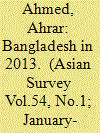

|
|
|
|
|
| Publication |
2014.
|
| Summary/Abstract |
Bangladesh in 2013 exhibited intense political polarization that was both frustrating and ominous. Several factors exacerbated political tensions in the country including the war crimes trial and disagreements relating to the caretaker government. Judgments and rulings by the courts also fed the forces of political turmoil. The economic situation was relatively good but faced increasingly difficult challenges. In terms of international relations, particularly with India and the U.S., the year was unproductive.
|
|
|
|
|
|
|
|
|
|
|
|
|
|
|
|
| 2 |
ID:
117113
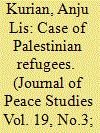

|
|
|
| 3 |
ID:
134049
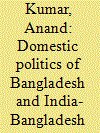

|
|
|
|
|
| Publication |
2014.
|
| Summary/Abstract |
The foreign policy of a country generally changes incrementally but in the case of Bangladesh it changes dramatically towards India depending upon which political party or alliance is in power. The ideological cleavage prevailing in the country affects not only its domestic politics but also its relationship with its neighbour India. In this article an attempt has been made to explain why and how the domestic politics of Bangladesh affects India-Bangladesh relations. It explores some of the historical processes that resulted in the formation of community consciousness among the Bengali Muslims. It also discusses the interests of different sections of society, such as the army and traders, who influenced the country's foreign policy in the post-liberation period as well as those who actively participated in the Liberation War of Bangladesh and who are pro-peasant and friendly to minorities. In this article the focus is on the domestic politics of Bangladesh. The main argument is that since there is no consensus in Bangladesh over how to best serve its national interest, the foreign policies of the two major political parties are completely different and allow the domestic politics of Bangladesh to affect the bilateral relationship with India in a way that is mostly independent of India's actions. It also suggests that India can only be insulated from Bangladeshi domestic politics after the delegitimisation of anti-liberation forces in Bangladesh, which could happen with the successful completion of the war crime trials.
|
|
|
|
|
|
|
|
|
|
|
|
|
|
|
|
| 4 |
ID:
129000
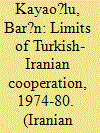

|
|
|
|
|
| Publication |
2014.
|
| Summary/Abstract |
Why did Turkey and Iran fail to become close partners in the 1970s even though they had compelling reasons to do so? This article argues that mutual distrust between Turkish and Iranian leaders, domestic turmoil in the two countries, and diverging geostrategic priorities undermined Ankara and Tehran's efforts to deepen their relations. While the shah of Iran saw his country as the policeman of the Persian Gulf and the Middle East, successive governments in Turkey continued to look west for their security. As economic and political turmoil engulfed the two countries, leading to a revolution in Iran in 1979 and a coup in Turkey in 1980, Iranian and Turkish leaders could not forge a lasting partnership.
|
|
|
|
|
|
|
|
|
|
|
|
|
|
|
|
| 5 |
ID:
132715
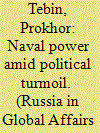

|
|
|
|
|
| Publication |
2014.
|
| Summary/Abstract |
The World Ocean is a key space for international relations and military policies of the great powers. It depends only on Russia whether it becomes an active player in this space or a passive observer. Naval power in the 21st century will probably play a greater role in foreign policies of maritime nations than in the 20th century. The 70/80/90 rule from the present U.S. naval strategy has already entered into wide use. This rule means that 70 percent of the Earth's surface is covered with seas and oceans, 80 percent of people live along coasts, and 90 percent of all world goods travel on the ocean. The world ocean is a source of an increasing number of conflicts and threats to international, regional and national security. Symbolically, the Ukrainian crisis, the most serious challenge for Russia's foreign policy in recent years, is directly related to the naval power issue. This article discusses in this context the strategic situation in the world ocean, relations among maritime nations, and some aspects of Russia's naval activities in the medium and long term.
|
|
|
|
|
|
|
|
|
|
|
|
|
|
|
|
| 6 |
ID:
107376
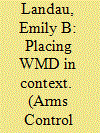

|
|
|
|
|
| Publication |
2011.
|
| Summary/Abstract |
If things go according to plan, a conference on a zone free of weapons of mass destruction (WMD) in the Middle East is due to take place in 2012. The considerable political challenges involved in convening this conference have become much more complicated of late in light of the political turmoil that has been rocking the Middle East since early this year. Although the date of the conference may get pushed back, unofficial Track II discussions already have begun to consider the prospects and logic of such a conference, which has effectively renewed the debate over the meaning and future of regional WMD arms control efforts in the Middle East.
|
|
|
|
|
|
|
|
|
|
|
|
|
|
|
|
| 7 |
ID:
106583
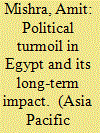

|
|
|
| 8 |
ID:
111762
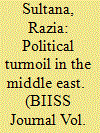

|
|
|
| 9 |
ID:
119902
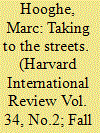

|
|
|
|
|
| Publication |
2012.
|
| Summary/Abstract |
Since 2011, various European countries have experienced periods of intensive political turmoil, with mass demonstrations that have sometimes turned violent. The high level of mobilization contradicts the often-expressed idea that young generations are no longer interested in politics, but hit the hardest by the economic downturn, the youth are most motivated to mobilize themselves.
|
|
|
|
|
|
|
|
|
|
|
|
|
|
|
|